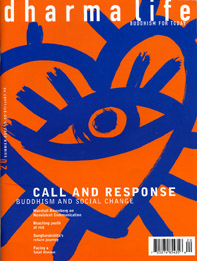Call and Response
Standing in London's Hyde Park amid a group of Buddhists, we planted our huge blue banner that read 'Buddhists for Peace'. It was dusk and the end of February's anti-war rally. As the crowds continued to surge into the park, we started to chant om mani padme hum. This is the mantra of Avalokitesvara, the embodiment of Compassion who is depicted with many arms – sometimes four, sometimes 1,000 – that reach out to all suffering beings.
Streams of demonstrators passed by, some oblivious, some puzzled by our chanting. Nevertheless a pool of stillness developed within our semi-circle, to which strangers were drawn. People were perhaps just curious, but others joined in the chant. Maybe they were gratified that the desire for peace that the march expressed had found this peaceful articulation among the flurry of banners and slogans. Then a sound system behind us started blaring out rap and our chanting was drowned in the din.
How do you make a difference? Despite the cliché of meditators who contemplate their navels, many of the Buddhists I know want to take action once they rise from their cushions. But what can we offer that really helps? Is it simply adding our voices to the clamour for peace? Or creating that pool of silence within it?
Offering an alternative is a traditional approach that is reflected in modern attempts to create new Buddhist social forms, such as those described by Ratnaghosha. Meanwhile other contributors are calling on their spiritual practice and principles in their efforts to alleviate conflict and suffering – from Marshall Rosenberg, the originator of Nonviolent Communication, to those working with disadvantaged communities in India, with troubled young people or with prisoners.
Whether we chant slogans or mantras, sit in meditation or an office, whether we engage directly with society's problems or construct an alternative, we can never avoid struggle and suffering. The challenge is always to meet life's difficulties with love, understanding and calm. And do this we must – as the poet Wordsworth wrote in 'French Revolution':
Not in Utopia, subterranean fields,
Or some secreted island, Heaven knows where!
But in this very world, which is the world
Of all of us – the place where in the end
We find our happiness or not at all.



